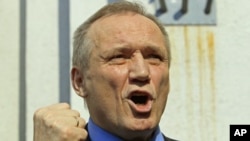Internet freedom and an economic free fall are combining for unprecedented protests in Belarus, a nation historically locked up by a Soviet-style leader.
Falling living standards are swelling protests against Alexander Lukashenko, the strongman who has long ruled Belarus through a combination of charisma and intimidation.
Overcoming fears of the police, drivers have purposely paralyzed traffic in Minsk, traders have wrestled with guards at the Polish border, and every Wednesday evening silent protests become weekly events in all major cities.
An opposition leader, Vladimir Neklyaev, emerged from a jail cell last month to find he had to catch up with the fast-moving Internet resistance movement.
Neklyaev and other activists predict harsh police crackdowns on upcoming silent demonstrations. Police vacations have been canceled, they said, as Lukashenko seeks to keep Soviet-style control over celebrations next Sunday marking Belarus Independence Day.
A Neklyaev aide, Andrei Dmitriev, said protest information spreads anonymously through Facebook and Russian social network sites.
“It is very dangerous to show that you are active, because you can easily be put in jail for any reason,” he said.
Internet usage has exploded in this increasingly urbanized nation. One third of Belarussian adults are now on social network sites. Last year, the number of people seeking news on the Internet jumped by 82 percent, according to Iryna Vidanava, who runs an opposition news and entertainment website.
She said the total audience of independent and opposition news sites now matches the viewership of one of the Belarus' top state-controlled TV channels. Looking ahead, Vidanava predicts the deteriorating economy will sharpen protests even more.
"The peak of the protests will be in the fall, not in the summer," said Vidanava. "Definitely the government does not know what to do about the financial crisis.”
In Belarus, discontent is as near as the closest food market.
On Saturday, 57-year-old pensioner Lilia sat with her plastic bags after shopping at the massive Komarovski Market. She said prices on locally produced mushrooms are jumping, but she is afraid to complain.
If you open your mouth, she said, you will be taken to prison.
Lilia says she now gets most of her news from independent sites on the Internet. She said that she and her adult children believe the economic situation will only get worse. But after last month’s 50-percent devaluation, there is no way they could afford to emigrate.
At the vast open-air market, shoppers throng sections selling locally grown vegetables and fruit. But at the fish and meat sections, business is slow. Saleswomen chat with each other or read magazines.
A 24-year-old Polish language teacher, Irina, said she is downsizing.
“People can buy some macaroni and rice, but not meat for sure,” she said.
At a music store nearby, music is thumping, but buyers are scarce. Store manager Evgeni said prices have not gone up much, but customers are cutting back on non-essential purchases.
Belarus devalued because it ran out of hard currency.
At the Korona shopping center, people stand outside a foreign-exchange booth, waiting for someone to come and sell dollars.
Galiya, a mother of a handicapped child said she had been waiting two months to buy hard currency to buy medicine.
To save time, people sign up on waiting lists. When dollars, euros, or Russian rubles come in, they get a call.
Outside the Lithuanian Embassy, 21-year-old college student Anastasia paused in her quest to get a visa that would allow her to travel to the European Union.
“The students I see are very unhappy with the situation," she said. "They cannot pay for their apartments, pay for their food.”
The International Monetary Fund predicted that inflation in Belarus will be 50 percent this year.
The former head of the National Bank, Stanislav Bogdankevich, ran through the debts that will come due in coming months.
Objectively, he said, the situation is going to get worse.
For now, he said, Lukashenko is printing money to pay for salary hikes, giving people the illusion they are keeping up with inflation.
The government’s long-term strategy is to find a large source of hard cash - fast. The president is offering to sell Belaruskali, the country’s largest company, to Russian investors for $30 billion.
But opposition leader Neklyaev said the company currently earns Belarus $3 billion a year. He said that at current rates, its potash reserves could last 200 years. Selling this state company, he charged, would be treason.
An economy spiraling downward, plus a new freedom to communicate, appears to be pointing to turbulent times ahead for Belarus, often called the last dictatorship in Europe.
Belarus Protests Fueled by Internet Freedom, Bad Economy
- By James Brooke




